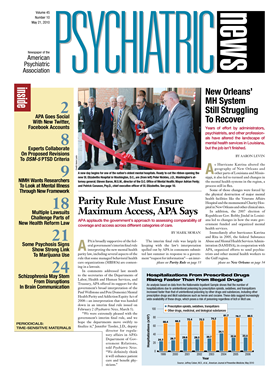Rising rates of diagnosed mental illness among older Americans have been identified in numerous studies in recent years, and a new analysis concludes that the prevalence of these illnesses among Medicare beneficiaries has nearly tripled from 1987 to 2006. Despite this growing patient population, however, mental health care accounted for a declining percentage of new Medicare spending in that same time period.
About 7 percent of Medicare beneficiaries had a diagnosed mental illness in 1987, while more than 22 percent had such a diagnosis in 2006, according to an analysis of Medicare data from 1987 to 2006 by Emory University researchers published in the April Health Affairs. This increase took mental illnesses from the eighth most common of the 10 leading chronic health conditions in the Medicare population to the fifth most common.
Kenneth Thorpe, Ph.D., chair of the Department of Health Policy and Management at the Rollins School of Public Health at Emory, who led the study, attributed some of the rising rates of mental illness to depression in patients being treated for cardiovascular disease and diabetes and not to increased screening for psychiatric disorders specifically.
“You're finding comorbid [psychiatric] diseases in more and more of these older patients,” Thorpe told Psychiatric News.
A 2008 National Institute of Mental Health study supports Thorpe's contention, having found that 14 percent to 23 percent of people with diabetes are found to have depression and that 18 percent to 20 percent of heart disease patients have depression. Patients with comorbid mental and nonmental illnesses are equally likely to develop either type of illness first, according to other recent research.
Despite this increasing prevalence, spending on treatment for mental disorders has accounted for a shrinking share of new Medicare spending in recent years. From 1987 to 1997, for example, spending on mental illness treatment accounted for about 9 percent of new Medicare spending, but the share of new spending dropped to just over 7 percent from 1997 to 2006, according to Thorpe's study.
He attributed this trend to the higher relative treatment costs of other increasingly common chronic health conditions.
The findings on mental illness prevalence and cost came as part of the researchers' examination of the role of chronic illnesses in Medicare spending increases. They concluded that increased spending on comorbid mental illnesses and other chronic diseases—especially diabetes and joint disorders—is a key factor driving the growth of overall Medicare spending.
Treatment of chronic health conditions is increasingly expensive, the authors noted, because Medicare pays for “episodic care” of these conditions, with little care coordination among the multiple clinicians that beneficiaries may see for their illnesses. The result is that only 56 percent of patients with chronic illnesses receive the amount of care recommended by experts in treating those illnesses, which often leads to a need for more expensive treatments when the patients' condition degenerates, according to a study by Elizabeth McGlynn, Ph.D., an associate director of RAND Health, and colleagues in the June 23, 2003, New England Journal of Medicine.
Comprehensive chronic-disease programs have become more common in private insurance plans, Medicaid programs, and Medicare Advantage plans. “But they are noticeably absent in traditional fee-for-service (FFS) Medicare—a crucial gap, given that 81 percent of Medicare beneficiaries are enrolled in FFS Medicare and account for about 79 percent of the program's overall health care spending,” wrote Thorpe and colleagues.
“It's a major shortcoming,” Thorpe said about the lack of care coordination that can lead to higher hospital readmission rates and other costly interventions for undertreated illnesses.
In addition, what chronic-care management there is within Medicare could be reduced in the short term with the enactment of the recent health care overhaul. The law phases out some payments for the Medicare Advantage plans that serve 10 million Medicare enrollees. These plans often provide chronic-care management, which advocates tout as leading to better health outcomes, though evidence of their cost efficiency is lacking. Under health care reform, Medicare will gradually reduce the extra payments to the private Medicare Advantage plans over three years until the amount matches what the government pays the companies for traditional Medicare enrollees. The reductions will help pay for much of the $940 billion 10-year cost of the health care overhaul.
Over the long term, however, the use of chronic-disease management could increase, because the new law also includes several small-scale pilot programs to spur improved care coordination for traditional Medicare beneficiaries. Among the new programs are accountable care organizations (ACOs), which will take responsibility for the costs and quality of care received by their patients over a set period. These ACOs may include multispecialty groups of health care professionals and providers (such as hospitals). The new law allows ACOs that meet quality-of-care targets and reduce their costs relative to a spending benchmark to receive a share of the savings they achieve for the Medicare program.
APA supports the use of ACOs to improve the care for people with mental illness, but staff plans to assess the implementation of ACOs because the concept is new and has never been used on a large scale.
